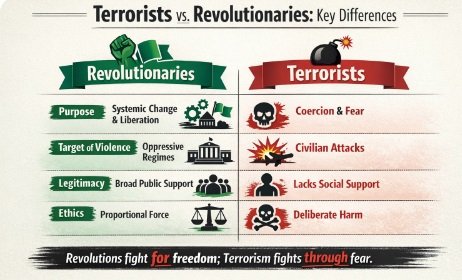Requirements not met
Your browser does not meet the minimum requirements of this website. Though you can continue browsing, some features may not be available to you.
Browser unsupported
Please note that our site has been optimized for a modern browser environment. You are using »an unsupported or outdated software«. We recommend that you perform a free upgrade to any of the following alternatives:
Using a browser that does not meet the minimum requirements for this site will likely cause portions of the site not to function properly.
Your browser either has JavaScript turned off or does not support JavaScript.
If you are unsure how to enable JavaScript in your browser, please visit wikiHow's »How to Turn on Javascript in Internet Browsers«.
Language / ভাষা:
Contemporary
Terrorists and Revolutionaries: The Fine but Crucial Difference
- Details

In today’s world, the terms terrorist and revolutionary are often used interchangeably, but philosophically and practically, they are very different. Understanding this distinction is not just academic—it shapes how societies respond to political violence.
Revolutionaries aim to transform unjust political systems. Their struggle is rooted in a vision for systemic change—overthrowing tyranny, ending oppression, or fighting colonial or authoritarian rule. Crucially, their legitimacy comes from the people: broad-based support, historical grievances, and often, international recognition. While some revolutionary movements have used violence, it is typically directed against oppressive institutions rather than innocent civilians.
Man Dies After Hours-Long ER Wait in Edmonton, Family Demands Accountability
- Details

Man Dies After Hours-Long ER Wait in Edmonton, Family Demands Accountability
The death of a 44-year-old Edmonton man after an extended wait in a hospital emergency department has sparked renewed concerns about emergency care delays, accountability, and potential systemic failures in Alberta’s health system. Prashant Sreekumar died on December 22 at Grey Nuns Community Hospital after arriving at the emergency room earlier that day with severe chest pain.
According to his family, he underwent an electrocardiogram (ECG) and blood tests shortly after arrival, both of which reportedly showed no immediate abnormalities. Despite continuing and worsening symptoms, he remained in the emergency waiting area for nearly eight hours before being taken into a treatment room, where he collapsed and died shortly afterward.
His wife, Niharika Sreekumar, describes repeated attempts by her husband to alert hospital staff to the severity of his condition. She says he experienced extreme pain, difficulty breathing, vomiting, dizziness, and dangerously high blood pressure during the wait. Despite these symptoms, the family was told his condition was not considered “acute” compared to other patients and that longer wait times were standard. The sudden death has left the family devastated emotionally and financially.
The couple has three children, including one who requires round-the-clock care. Although both spouses are accountants, Prashant was the sole earner for the household. His wife is now facing an uncertain future while grieving what she describes as a preventable loss. Beyond personal tragedy, the family is demanding answers and accountability, questioning whether negligence—or even racial bias—played a role in the handling of Prashant’s case. They argue that as Canadian citizens and taxpayers, they expected timely and adequate medical care in a life-threatening situation.
Alberta Health Services reports that average emergency wait times at Grey Nuns Hospital are just over three and a half hours, though individual waits can be significantly longer. Covenant Health, which operates the hospital, confirmed that the case is under review and has been referred to the Office of the Chief Medical Examiner. Officials say they are unable to comment on specific details while the investigation is ongoing, but have expressed condolences to the family. The case has intensified public debate about emergency room overcrowding, triage practices, and patient safety, raising broader questions about whether current systems are adequately equipped to recognize and respond to critical symptoms before it is too late.
Trump Raises Concerns Over $29 Million Grant to Small Firm in Bangladesh
- Details

Washington, D.C., February 21 – Former U.S. President Donald Trump has publicly questioned a $29 million grant provided to an obscure organization in Bangladesh, allegedly aimed at strengthening the country's political environment. Speaking at an event with U.S. governors on Friday, Trump expressed skepticism about the funding, suggesting that the recipient was an unknown firm with only two employees.
According to a report by the Times of India, Trump remarked, “$29 million went to an organization to strengthen the political environment in Bangladesh. The name of which no one has ever heard of.” He further highlighted concerns about the legitimacy of the recipient, stating, “What can you imagine? A small company here gets $10,000 or $100,000, but that company got $29 million. There are only two employees. I think they are going to be very happy, very rich. Their pictures will be published in big business magazines very soon.”
While the details of the organization in question remain unclear, Trump’s comments have sparked discussions regarding foreign aid distribution and oversight. Critics argue that such large sums should be subject to stricter scrutiny to ensure they are being utilized for their intended purpose. Others, however, contend that financial assistance to developing nations often involves partnerships with smaller entities to support grassroots initiatives.
As of now, there has been no official response from U.S. agencies responsible for foreign aid distribution, nor from the Bangladeshi government regarding the grant in question. The matter is expected to gain further attention as calls for transparency in aid allocation grow.
This development comes amid ongoing debates on U.S. foreign aid policies and their effectiveness in promoting democratic stability abroad.
Formation of 10th wage board for journalists, employees demanded
- Details

Formation of 10th wage board for journalists, employees demanded
DHAKA, Feb 19, 2025 (BSS) – Leaders of Bangladesh Sangbadpathro Karmachari Federation (BSKF) and Bangladesh Federal Union of Newspaper Press Workers (BFUNPW) have demanded formation of the 10th wage board immediately for journalists and newspaper employees-workers.
- Additional Resources:
- Additional Resources:
- Agro-Ocean
- Asian News and Views
- Bangabandhu Development and Research Institute
- Bangladesh North American Journalists Network
- Bangladesh Heritage and Ethnic Society of Alberta (BHESA)
- Coastal 19
- Delwar Jahid's Biography
- Diverse Edmonton
- Dr. Anwar Zahid
- Edmonton Oaths
- Mahinur Jahid Memorial Foundation (MJMF)
- Motherlanguage Day in Canada
- Samajkantha News
- Step to Humanity Bangladesh











